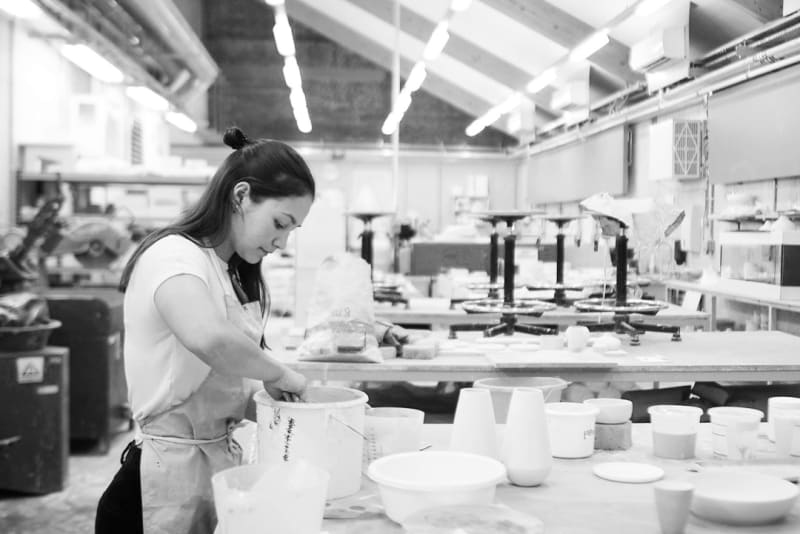



I am an award-winning ceramic designer and materials researcher; my practice is focussed on reducing the environmental and societal impacts of ceramic production.
In my final year at Central Saint Martins, I designed an industrial symbiosis around the ceramics industry, whereby waste from one industry replaces the raw materials in ceramic production. My methods and processes of producing ceramics from 100% waste are shared in my book, Circular Ceramics, allowing fellow ceramicists to adopt the sustainable processes in their own practice.
Since 2020 I have continued to work on expanding the use of industrial waste streams, participated in exhibitions, and delivered lectures, workshops, and talks. Currently, I am collaborating with ceramic producers and mass manufacturers to implement the use of industrial waste on a larger scale. I have since gone on to establish Golden Earth Studios with the managing director of Golden Earth Developments. The initiative connects and facilitates artists and makers, with access to the by-products of the construction industry to replace virgin raw materials.
In 2022, I launched a coral propagation programme in the Maldives with Kevala, a research project that began in my 1st year and is now being implemented in the Fari Islands. I also co-found Golden Earth Studios which works with property developers to divert excavation waste consisting of clay, into the hands of ceramicists.
My name is Sara Howard and I am a sustainable materials designer for the ceramics industry. My practice focusses on building an industrial symbiosis around the ceramics industry, whereby the by-products from one manufacturer, replaces the raw materials in ceramic production. With industries consuming finite raw materials far quicker than they are being regenerated, scarcity and increase in price continues to impact industries. Industrial waste sent directly to landfill, contain these finite raw materials which I use to substitute the virgin raw materials in ceramics.
After specialising in product design during my foundation, I went on to study BA Ceramic Design. Since graduating in 2020, I have continued to develop my research and expand the industrial symbiosis. I collaborate with small scale ceramic producers and soon I’ll be working with a ceramic mass producer that supplies tableware globally to make changes on an industrial scale. I also teach part time at CSM on the BA Ceramic Design course.
My graduate project, Circular Ceramics, which I continue to develop and work on today, includes ceramic collections made from 100% industrial waste. The focus is to eliminate the consumption of finite raw materials and divert toxic and hazardous industrial waste from landfill. It also includes a self-published book, which outlines my methods for fellow ceramicists to apply to their own practice and is released under a creative commons license.
The first time I ever encountered ceramics was during my foundation course at CSM. Without that experience, I would have probably studied product design. The ceramics degree encourages designing through making, a very hands-on approach, which aided my extensive testing of waste materials. The foundation course geared me up well for the structure of each unit of my degree and therefore I was far more confident when approaching new briefs and assessments.
The foundation course was one of my best years in education. It can be intense as you fly through small projects, one after the other. It can sometimes feel like you must make big decisions about your career quickly, as you continue to specialise throughout the year. My best advice would be to just roll with it. Make the most of the opportunity to work with new materials and learn new approaches to design. There could be that one experience that sparks an interest, which you end up building your career from.